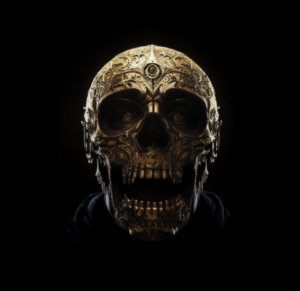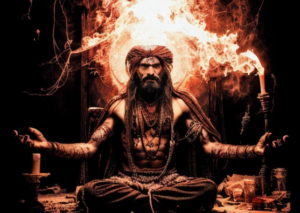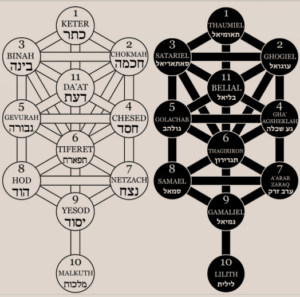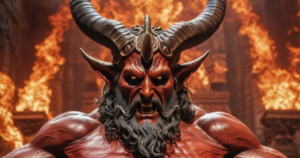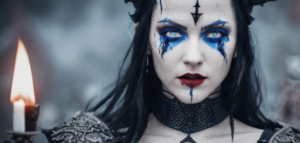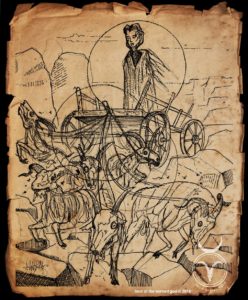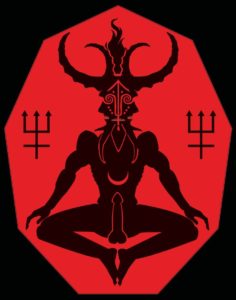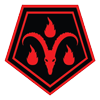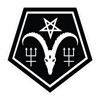Shadow Integration and Psychological Wholeness
Aghori Sadhana (The Cremation Ground)
By Mariam Gergis (Shayṭānata, شيطانة)
Beside the burning pyres
Where Varanasi’s dead find peace,
The Aghori sits in meditation
On what never finds release.
Ash smeared across dark skin,
A necklace carved from bone,
He contemplates the teaching
That we die as we have grown.
His bowl: a human skull,
His blanket: shroud of the deceased,
Each shocking implement sermon on what’s least
Acceptable to minds that cling
To comfort and to form—
Yet in this grim surrounding
Wisdom weathers every storm.
He eats what others will not touch,
Sleeps where fear would wake,
Not from madness but from seeing
Through illusion’s false display.
The corpse beside him teaches
What the living will not hear:
That beauty, ugliness,
Pure and foul disappear
When consciousness expands beyond
The boundaries of taste—
In the democracy of ashes,
Nothing goes to waste.
The western mind recoils,
Calls this practice dark,
Yet the Aghori smiles
At each judgmental mark.
For he has learned the secret
That makes all pathways one:
What we resist persists
Until resistance is undone.
Qliphothic Workings (Kabbalistic Shadow)
By Mariam Gergis (Shayṭānata, شيطانة)
In chambers draped with crimson cloth,
Where Hebrew letters burn In configurations that reverse
What righteous minds would learn,
The magician traces backward
The paths of the Tree of Life,
Descending through the shadows
Where light becomes the knife
That cuts through all pretension,
All masks of holy pose,
To find what lies beneath
The face that no one knows.
Lilith’s sigil glows In candles black as night,
While incense thick with myrrh
Obscures the chamber’s sight.
This is not evil worship
But psychology made flesh:
The integration of the parts
Where light and shadow mesh.
Each Qliphah explored
Reveals another face
Of what the psyche hides
In its forbidden space.
Samael whispers secrets
Of the rage we dare not feel,
While Gamaliel unveils
What we refuse to heal.
The practitioner emerges
Not possessed but whole,
Having claimed dominion
Over every aspect of the soul.
For the Tree has roots as deep
As its branches reach up high,
And wisdom lives in darkness As surely as in sky.
Vama Marga (Tantric India)
By Mariam Gergis (Shayṭānata, شيطانة)
In Kashmir’s hidden temples,
Where orthodox eyes cannot see,
The forbidden rites unfold
Under the dark moon’s decree.
Five elements transgressive:
Wine where water should be blessed,
Meat where vegetables were pure,
Fish where fasting was the test.
The circle of the initiated
Sits cross-legged on the floor,
Each taboo a doorway opening
To what was barred before.
She drinks from the skull cup,
Not in worship of death
But to shatter the illusion
That separates breath from breath.
The Shakta raises trembling hands
Above the sacred fire,
Speaking mantras that unmake
What convention would require.
This is not destruction
But integration’s art:
The poison and the nectar
Both held within one heart.
When dawn breaks over mountains,
The forbidden has become holy,
The practitioner transformed
Through embracing wholly
What society names darkness— Yet here burns clearest light:
The recognition that division
Creates suffering’s blight.
The Salt Circle
By Mariam Gergis (Shayṭānata, شيطانة)
With deliberate steps I walk the perimeter,
Salt streaming from my closed fist
Like seeds for an invisible garden,
Marking the boundary between worlds.
Here: where ordinary time stops.
Here: where intention becomes reality.
Here: where I am both priest and congregation,
Both question and answer.
The white crystals catch moonlight,
Each grain a small commitment
To the belief that we can create
Pockets of power in powerless times.
Inside this circle, I am sovereign.
Inside this circle, magic is practical
As bread rising, as blood flowing,
As the earth turning toward spring.
When morning comes I’ll sweep it up,
Return the salt to kitchen shelf,
But tonight it holds the space
Between who I am and who I’m becoming.
The circle is drawn.
The circle is cast.
The circle holds
What the heart asks.
Who the Horned God really is
By Thomas LeRoy
“Even if one recognizes the character inversion employed by changing Pan (the good guy), into Satan (the bad guy), why reject an old friend just because he bears a new name and an unjustified stigma?” ~ Anton LaVey
The Horned God represents the primal power of nature, the human as animal, the beast within us all. A beast that should not be ignored. I fully understand that the Horned God from today’s pagan perspective is a 20th-century invention. This version is the consort of the much more important “Goddess”. He is a happy hippie who sits around with bunnies in a meadow, ready to service her.
What I’m referring to when I say “Horned God” is something deeper, something truly ancient. Besides the Sun and Earth, he is perhaps the most primal of gods, not only historically, but psychologically. It is believed that reverence for a Horned God dates back to the Paleolithic. Even though the name of that original horned god etched on a cave wall has been lost to antiquity, his essence lives deep within the human psyche, surviving in the collective unconscious. And that’s what we’re after in the organization The Sect of the Horned God, getting to that core primordial truth, not through faith, but through philosophical, psychological, and historical means. I’ve always been the type that likes to dig deep to discover the core truth behind any given subject. This is reflected in my interest in history, anthropology, genealogy, and so on. And the occult is no different. And with The Sect, I’m daring to cast a wide net in an attempt to pull up more than just the contemporary left-hand path practices. For example, is there a PIE Horned God that connects Cernunnos of the Celts to Pashupati of the Hindus? They look very similar with similar attributes. And why does there seem to be a connection between the LHP and the Horned God archetype? Is this why the Church in the Middle Ages fused the characteristics of the pagan Horned God onto Satan?
“The combination of horned gods, one Celtic (Cernunnos), one classical (Pan), produced a very powerful deity around which the “pagani” rallied. Indeed, so powerful was this god that the Christian priests cast him as the prototype of the Devil . . . ”
~ Georg Luck
The Horned God has been called “The God of the Witches”, “The Consort of the Goddess”, “Guardian of all things untamed”, “Lord of Shadows”, “Master of Darkness”, and the “Devil” by the Church. He is the antithesis of all that the Christians saw as holy for he represents power, lust, carnality, death, and knowledge. And for their dogma to survive and for there to be calm within the flock, the Horned God’s traits in the human character must be subdued. But the early Christians knew that the Horned God was a large part of what a human being is. By telling people that who they are at their core is evil, they created a very effective way of controlling the masses. Thus, they made the Horned God synonymous with the supreme “bad guy” in their mythos.
The Sect of the Horned God was created to bring about a rejuvenation of the Horned God archetype by revealing his many faces as the anthropomorphize primal essence of the LHP. What I’m after, both historically and psychologically, is the core truth of this philosophy. Even though the modern pagan community doesn’t want to admit it, there is a real connection between the Horned God and the LHP, because gods such as Odin and Shiva have horned god roots. In their raw form, these gods were not compassionate father figures. They were gods of wrath that have been around for a very long time, and, as stated, if the past was brutal, then it would have been reflected in mythology. And the foundation, the religious or moral philosophies of any given society, would reflect this fact. That’s what the predominant religion of society does, it establishes a deep, cultural framework, whether we like it or not. So, if you have a barbaric warrior culture, the myths — and the gods that populate those myths — are not going to be ones of compassion, and empathy. Their archetypal motivation would be for the benefit of a specific populace. And for a society to survive in a savage age, then brutality would be the norm. Thus, the “Gods of Wrath” would take center stage.
“But what about Rome?” you may ask, “Didn’t they adopt Christianity as their official religion, and they were brutal?” Yeah, and about 160 years after the adoption of Christianity the Western Roman Empire was no more. There were many reasons for the collapse, but one valid reason was they substituted a master morality for a slave morality. According to Friedrich Nietzsche, the two primary types of morality are master morality and slave morality. Master morality is where “good” and “bad” are equivalent to “noble” and “despicable”. Slave morality’s standards hold to that which is beneficial to the powerless and weak, such as sympathy, kindness, and humility. Thus the strong, confident and even the individualist are evil.
What we know of the Gods of Wrath here in the West is opaque, for the myths and legends of the distant past have been coated with a veneer of Christian slave morality. This being so, it’s somewhat hard to make out the details beneath the surface. An example of this Abrahamic abridgment would be the writings of early 13th-century Icelandic historian and poet, Snorri Sturluson. First off, we should all be thankful to the man for his writings because if he hadn’t done so, we would know very little of the Norse gods. But in his works, he turned the dark god Odin into a quasi-Norse Yahweh. This was because Snorri was a Christian, and it was hard for him to view the gods any other way than by the good/ bad duality. Even though Odin did some horrible things, often directed at the other gods, in Snorri’s eyes, he had to be a good guy. It couldn’t be that the Allfather had a shadow side. The problem with most modern pagans is that they believe these safe versions of the gods are the original versions. They need to do this, censor the gods because the brutal reality of what they were would make them weep.
Well, this brings us back to the Horned God. And if you’re discussing the horned god with a glassy-eyed, tree-hugger the “Goddess” will come up, along with a “Blessed Be”. Neo-pagans see the Goddess as the “Holiest of Holies” while the Horned God has been relegated to the position of Her “boy toy”. This feminized cartoon version of the Horned God co-insides with their white-light beliefs. But, then again, some people are drawn to the ethereal, and if you are and want to get lost in a great cosmic collective filled with unicorns and rainbows, then maybe this safe modern version of the Horned God, and the gods in general, is the thing for you. Grab your tied-dyed moo-moo and bongos and join them, those happy gods are waiting to give you a big fat hug.
But it’s bullshit! And why do I say it is bullshit? Because I know reality isn’t pretty! Maybe the reason I don’t buy into this nonsense is that I have an independent spirit, and an affinity for what some may call the “darker side of life” and would rather disrupt the herd than join it! So, a more truthful, savage representation of the Gods better suits me. And there are many examples of these gods out there, from Rudra to Wotanaz. But even though I may be drawn to the Horned God, I can’t ignore the Goddess. In my eyes she isn’t some vapid being, spreading white light and rainbows. No. She’s the Dark Mother. She is Kali Ma, the ferocious form of the Goddess, represented with what are arguably the most savage features of all the gods. Where Shiva is consciousness, Kali — in the form of Shakti — is energy, the dynamic aspect of Transcendental Reality. In her ferocious form, Kali both creates and destroys, drunk with the paradox that death feeds on life, and life feeds on death. Kali represents that in the East these ancient Indo-European gods were never coated with the veneer of the Abrahamic. Even though there were attempts by the Muslims to do so.
“An approach via the East will disentangle many of the arguments from the sometimes hopelessly confused jumble we find in the historical sources of the left-hand path in the West.”
~ Stephen E. Flowers, PH.D.
Because of their lack of Abrahamist taint, I have incorporated the Eastern gods into my philosophy and that of The Sect. Where here in the West the gods have been watered down, there, in the East, they’re still full strength. I know in India they have some silly pop-culture versions of the gods, but that doesn’t take away what they are culturally, or philosophically. The Hindus know their true nature.
What I want is to acknowledge the gods as they were meant to be, not what those who can’t get over their Christian upbringing wish they were. I want to experience them because that’s what you do, you don’t worship the gods, you experience the gods, and you should experience them in their true nature . . . raw, bloody, and real.
Blood for Odin
A work of fiction by Thomas LeRoy
From out of a blue-black night sky painted with faint silver clouds like stripes across the Infinite, the Moon’s radiant glow reflected upon the sea’s subtle ripples like thousands of bobbing and dancing crystals. The crisp salt air was still and all that could be heard was the faint crash of waves, the crackle and pop of torches, and the low muffled groans of the dying.
On a small rocky isle off the western coast of Scotland, thirty grim torchbearers clad in black chain mail and furs, gathered in a wide circle around a rowan tree. In the tree’s higher branches were perched a pair of ravens, while in its lower branches hung three bound men, souls slowly being squeezed from flesh as nooses tightened.
Standing before one of the hanged men was a tall, hooded woman clad in flowing layers of black, her garb covered in red runes, staves, and sigils. About her neck hung necklaces of various lengths with amber and glass beads, bear claws, and human bone. In her right hand, she clutched a bejeweled dagger, and as she brought the blade up to full red lips to kiss, the torchbearers began to hum, low and guttural, from deep in their throats.
“Just as Odin hung from Yggdrasil”, the sorceress said, now raising the dagger above her head, “so shall thee. This honor I bestow upon thee.”
She stepped toward the man hanging closest to her, reached up, and drove the blade into his naked belly. The hanged man stiffened as she pulled the dagger with both hands across his gut. Flesh parted, and like a great mouth vomiting, out spilled red blood and steaming blue/pink viscera. As much of the contents splashed upon the rocky earth, the woman stepped back. After a moment she removed her hood, revealing a head of long black hair and an elegant visage with cold blue eyes the color of the North Sea. When all life had departed the body, she reached forward and dipped a finger into the sanguineous gore. With the dripping finger, she drew the Thurisaz rune upon her forehead and began to chant Odin’s many names.
As she completed the sacred naming the humming stopped and the two ravens, who had been watching from the tree-top, took to flight, circling the tree in opposite directions before alighting at the feet of the sorceress.
“So it is done,” she said. “Blood for Odin.”
“Tug harder, you dogs!” the ship’s captain barked as his four slaves pulled a fishing net onto a high-prowed, broad-waisted galley. “Get that net in if you want to eat!”
“Aye, Captain!” shouted one of the slaves, a short, bald man with a gap-toothed grin and a deeply scarred pink pate.
Even though it was four to one, the thought of overpowering the captain never crossed the minds of the slaves. This was not only because of the wrought-iron collars about their necks pronouncing their status but also due to the psychological chains placed upon them, chains heavier than iron.
Another of the slaves, a lean man with long hair and a beard the color of pale copper, gritted his teeth as his muscles strained. It was a wet, gray morning and the drab brown wool he wore was soaked, as was the wool cap on his head. Even though his face was twisted with the strain, his green eyes were almost blank, expressionless. Where there was once a proud Pict, now stood a being reduced to a cold, empty husk. That flame that makes one alive was now but a flicker.
“Harder, I say!”
“But the infidel here,” said the bald slave as he nodded toward the copper-haired man beside him, “is not putting his back into it!”
“Come now, Heathen!” said another, a wiry, unpleasant-looking creature with a dark, rodent-like aspect. “You want your bowl of porridge, don’t you?”
And the fourth, a stocky wide-eyed mute with swarthy Mediterranean features, nodded and chuckled as he tugged.
“Enough!” said the captain, an oversized, gray-bearded Scot of Dal Riada. “Shut your mouths and don’t lose any of my fish!”
With one last tug, the four hauled the bulging net over the side and onto the deck, where out spilled hundreds of fish, like shards of living silver, flopping spasmodically.
“Now, you know what to do!” said the captain. “Into the barrels with them!”
As dusk fell upon the Hebrides the fishermen completed their duties before anchoring off the shore of a minor, barren island. There, under a blood-red sunset, they settled in for the night instead of making the long haul back to the coast. The seas were calm, and the weather not unbearably cold, for the Summer Solstice was nearing.
The one they called “Heathen” watched the others warily as he sat on his oarsmen’s bench spooning mushy oats into his mouth. He was relatively new to this vessel, having been purchased by the captain from another slave master but a fortnight past. His total years in bondage, he was not sure. Was it ten years, twelve years, or twenty years? Time meant nothing. Where once keeping track of the days, the moons, and the seasons was his duty, now one day ominously dissolved into another, sometimes slowly, sometimes quickly.
He had been a druid, the last of his kind, and he made a conscious effort not to log the days, for that was of the past, and in the past lingered the shadows of Death. He dared not dwell upon his memories because the past was red blood on white snow and the black of scorched ruins. The past was his slaughtered daughters, brother, and kin, slaughtered on the night the Dal Riadans came.
His people had been the last of the Old Ways, living on the border of Pictland and Dal Riada. Besides a few minor clashes with the Scots to their west, they lived in relative peace with their neighbors until eventually, the Dal Riadans had had enough of their presence. The gods of the past were seen as a threat to the new god, the “White Christ”. These pagans were a blight amongst the otherwise civilized kingdoms of Northern Britain. And with the new threat of the infidel Northmen, the idea of unbelievers upon their border was more than they could take. So on a cold winter’s night, they came from Dunadd with sword and flame to lay waste to the vile heathens.
The Scots were silent, quick, and numbered in the hundreds, swarming over the wooden palisades of the dun, killing with the blind madness of devout zealotry. The women, children, and elderly that could not fight or flee into the surrounding woodland were slaughtered, while Heathen and the other men, along with some of the women, battled for their survival.
The horror of that memory! The screams, the crackle of flames, and the sound of collapsing timber. There was also the final image he remembered from that night, which was indelibly imprinted on his psyche, just before he was struck down by a blow to the head. That final image was the chieftain of his people, a scene of savage fury, a fury that could only arise from the soul of a Pict. The man was a brutal silhouette against the flames of the burning drinking hall slaying Dal Riadans with a sword forged in the frozen north. Whether he had perished that night, he did not know.
Heathen awoke the next morning covered in a light dusting of snow and ash, his left eye glued shut from dried blood, his head throbbing. With his right eye, he spied the black, smoldering ruins and the hacked bodies, limbs, and entrails. So many butchered, mangled bodies, he could not tell who was who. A number of the Scots were laughing as they watched two dogs compete in a tug-of-war over some poor soul’s small intestine. Most of the Scots, though, milled about, searching through the horrific rubble for something of worth. He was of worth, he guessed when a pair of them noticed he was amongst the living. They grabbed him by the ankles and dragged him across the frozen, scorched earth, depositing him in the back of a cart. Thus began his benefaction of forced servitude.
There was a chill in the air that night off-shore of the islet as clouds rolled in covering the moon and stars. Heathen lay on his bench under a thick woolen brat he used as a blanket, while a burlap sack filled with his few personal items served as a pillow. Looking straight up past the mast, he saw two birds circling the boat, black against a sky of dark slate. Strange, he thought, they didn’t appear to be sea birds, more like crows or ravens. The night was quiet but for the knocking of the rigging and the light splashing of waves against the hull. But he knew that wouldn’t last because the captain, drunk in his hammock at the stern, would begin snoring. The captain, as slave masters went, was a relatively decent man having shown little sign of malevolence. He was a man after coin, and the sea was filled with that which lead to it. The three other members of this reluctant crew were a different story. Balbh, the mute, slept on the other starboard bench next to Heathen, while Radan was across from Balbh and Maol across from Heathen. All three were irredeemable cretins, criminals sold into slavery, their true nature amplified due to the captain’s leniency. And when the captain began snoring, they seized the initiative.
“Are we awake, Heathen?” came a low voice.
Heathen sat up to see Moal and Radan standing across from him, while Balbh was to his right, staring down with that mute, idiotic grin.
“It’s time to get to know you better, you lazy bastard,” Moal said then licked his lips.
Now, those few words spoken by the man called Moal were but a subtle rendition of intimidation, if you will. But he may have selected other words — more meaningful words — if he had known that they would be the last he would ever speak, for his head nearly exploded as an ax, thrown from out of the black of night, buried itself into the back of his skull.
“Northmen!” yelled Radan.
As if the night-shrouded sea had birthed mail-clad demons, bearded Norsemen swarmed the galley from their black, dragon-prowed longship which had silently maneuvered itself beside the fishing vessel.
Heathen leaped to his feet, and like removing a hatchet from a stump, yanked the ax from Moal’s head. He swung at the invader nearest to him, ax blades clashing, creating sparks, again and again.
Why he fought with an unbridled passion for life, he was not sure for hadn’t the gods forsaken him? Heathen’s fighting style was not that of a trained weapons man, but one of instinct, of memory found in the genes of the Pict. And it was that instinct usurping the ever-present defeatism that kept him alive.
The captain, now awake, and with a gaff in his hand, lumbered forward like a bear with one elongated claw. He drove the hook into the eye of an attacker, while at the same time that Norseman buried his ax in the captain’s chest. The Norseman tore off his spangenhelm, then let forth a howl of pain and rage as he yanked the gaff out of his head, leaving a bloody cavity, and an eyeball with a red ocular nerve hanging at the end of the hook. The captain, wide-eyed, and coughing up blood, staggered a few feet, pawing at the blade in his shattered ribcage, before tumbling overboard.
“Thrir!” yelled one of the Norse. “ Thrir!”
With that call, the tone of the attack shifted and Heathen found himself now overcome by the Norsemen, not with their axes but with hands, grabbing him, his weapon torn from his grip. Had they been toying with him? Was the fight but play? Large hands had him by the arms, back of the neck, and hair. He could feel the Norsemen’s breath on the side of his face. A pair of them grabbed each of his legs and lifted. He could see Radan and Balbh, still alive, in similar situations. They were being hauled, like sacks of meal, from the fishing vessel and passed onto the longship.
The trio was carried down the center of the vessel before being deposited upon the deck before a black-clad, hooded woman. The woman was seated at the bow upon a large wooden chair, a chair carved with knotwork, and interlace patterns. A pair of ravens were perched atop that high-back chair, their small black eyes staring intently, while two huge, black-bearded Norseman stood on either side of the woman, the one on her right holding a torch, the one on the left, a spear.
“Greetings,” she said softly. “I am Solveig Skulidottir and you are welcome upon my longship.”
“You speak our language,” said Radan as he got to his feet, Balbh beside him, Heathen behind, with the Norsemen crowded all about, armed, silent, and motionless, save for the one tending to his bloody empty eye socket.
“I speak many tongues,” said the woman. Her tone was calm, almost comforting.
“What do you want with us?” said Radan.
She smiled. “I’ll ask the questions, and I’ll begin with you,” she said, pointing at Balbh. She gave a slight nod to one of her many men standing behind the three slaves. That Norseman, holding a small hammer, stepped forward, took hold of Balbh’s slave collar, and knocked the pin from the collar, freeing it from around the mute’s neck. He did the same to the other two. The man then tossed the collars into the sea.
“Thank you, M’lady,” Radan said as he rubbed his neck. “But my friend here, can’t talk. Got his tongue torn out. No one knows why on account he can’t tell us!” he said, laughing.
She nodded as she chuckled. “All right, does he have a name?
“We just call him ‘Balbh’,” Radan said.
“Well, I have a question for our friend Balbh that mayhap you can answer,” Solveig said.
“Anything, M’lady,” Radan said with a rat-like grin.
“Good,” she said. “What is his worth?”
“What do you mean? Like in coin?” said Radan.
Solveig shook her head. “No, what is his worth as a man? A person?”
“I don’t understand,” said Radan. “We are slaves so our worth . . . Do you mean like in strength?”
She shrugged. “It could be. Could be many things.”
“Well, Balbh here is very strong, can pull an oar better than any man I know,” Radan said, as he patted Balbh on the shoulder. “He may look like he hasn’t two wits about him, but I’ll tell you Balbh here is a fast learner. Smarter than most.”
Solveig nodded. “Good,” she said. She looked at another Norsemen standing behind the captives and made a subtle hand gesture. That man stepped forward and grabbed Balbh. A confused look fell upon the mute’s face as the man ripped off Balbh’s tunic, then bound his wrists behind his back before seating him upon the foremost bench.
“What’s this all about?” Radan said.
“It’s all part of the procedure,” Solveig said. She smiled. “Now, my loquacious friend, what is your name, and what is your worth?”
Radan cleared his throat, feeling a bit uncomfortable. “I am Radan, M’lady, and I am a rather fine cook . . . also I have a singing voice unmatched in all of Northern Britain,” he said with a slight bow.
“Well, give us a song then, Master Radan,” said Solveig. “If you’d please.”
Radan nodded, cleared his throat again, and in a smooth tenor began singing of a fair noblewoman of Northumbria and her dying lover. When he had completed, Solveig applauded.
“You do have a fine voice, Master Radan,” she said. She made that same gesture again and the same Norseman came forward, grabbed Radan, ripped off his tunic, bound him, and seated him beside Balbh.
“Have . . . have we offended you, M’lady? Radan said, confused.
“Quite the contrary,” Solveig said. “You have truly revealed to me your worth.” She looked up at Heathen. “Now, whom might you be, and what is your worth?”
“My name is Heathen,” he said in a low voice.
“No, it isn’t,” Solveig said. “What is your name?”
There was a long pause. “I was called Turlogh mac Ragnall,” Heathen said. It had been years since he said those words — his birth name. It felt odd on his tongue.
“Ragnall?” Solveig said, confused. “How did your father get a name like Ragnall? Are you Norse?”
Heathen shook his head. “I am Pict. How my father got his name, I know not.”
Solvieg sighed. “All right. So, why did you call yourself ‘Heathen’? Are you not a Christian?”
Again he shook his head. “I was a druid, follower of the Old Ways.”
Solveig sat forward. “Really? I am intrigued. Tell me more,” she said.
Heathen shrugged. “What is there to tell?”
“Much,” she said. “I thought all you Britons were followers of the Christ.”
“Not all,” said Heathen.
“Why not you?” Solveig said.
“My people — my tribe — held true to our ancient traditions,” he said. “I think it madness that any Pict would adopt the faith of the invading Romans.”
“That was long, long ago,” Solveig said. “You still hold a grudge?” She laughed. “Anyway, tell me of your gods, Turlogh mac Ragnall?”
“I have nothing to tell,” he said. “My gods have forsaken me.”
“Impossible,” Solveig said. “That is like saying the winds have forsaken you, or the tides. The gods are what they are. Now, tell me of your gods.”
“I can not tell you of that which I can not see,” Heathen said.
“What do you see then?” Solveig said, her elbows resting on the arms of her chair, her hands steepled under her chin.
Heathen stood silent, staring at the woman. “I see nothing,” he finally said. “Only the Abyss.”
“The Abyss is something,” Solveig said. The Abyss is the primordial depths, the dwelling place of the Thurses, and of Ýmir. See that?” she said, pointing to the longship’s great black sail with a red rune painted on it. “That is the thurisaz rune. That is the symbol of the Abyss, so there is much in those dark depths you are not seeing. Open your eyes.”
“They are open, woman,” Heathen said with a huff.
Solveig shook her head. “No, they’re not. Now, close them, and while they are closed, open that special eye and tell me, tell me what you see.”
“I am done with this foolishness,” Heathen smirked. “Done answering questions. Do whatever it is you’re going to do.”
“I can’t. I must first find your worth, and right about now I am finding none,” Solveig said with a sigh. “There must be three of you. Two are dead and only two have shown their worth. And you,” she paused, staring at the Pict in the glow of the flickering torchlight, “you might have more worth than the other two combined, but it must be revealed to me. I must know it in my heart or Odin will forsake my offering.”
“Come now, Heathen!” Radan said. “Reveal what little worth you have and let’s be done with this!”
“Wake up, you dolt!” Heathen said to Radan but with his eyes locked on Solveig. “Have you not figured it out?”
“What do you mean?” Radan said.
Heathen turned to Radan. “We are the offering!” he said with a grin filled with irony. “We are to be sacrificed to her dark god!”
“Sacrificed?!” Radan said, his brow in a gnarled bunch.
Solveig shrugged. “Did not your god allow his son to be sacrificed?” she said to Radan. “And you,” she said to Heathen. “Do not your people — people of the ‘Old Ways’ — make offerings to the gods?”
“We have, in times of need. Desperate need,” Heathen said.
Solveig put forth her hands, palms up. “Who is to say we are not in desperate need?”
Heathen looked about. “These men of yours do not look so desperate to me.”
“Ah, but there are different kinds of desperation,” Solveig said. “There is the desperate hunger of the soul.” She pointed at Heathen. “I see that in you.”
Heathen shook his head. “You know nothing of me.”
“I know a man in pain when I see one,” Solveig said.
Heathen stood silently glaring at the sorceress. The spear-bearer beside her tightening his grip on his weapon as one of the ravens flapped its wings restlessly.
Eventually, Heathen spoke: “I have lost everything, my home, family, freedom, so do what thou wilt with us.”
“Speak for yourself!” hissed Radan from the bench.
“I have a question, Turlogh,” said Solveig as she reached up and scratched the feathered belly of the restless raven. “If I were to have you thrown overboard would you cry because the sea is wet?” She shook her head. “Fate is cruel. That is the way of things. Of reality. How can a once-mighty druid of the Northern Britons cry over the unchanging natural state of existence?”
Heathen gritted his teeth. “Because everyone I know — everything I know — was slaughtered!”
Solveig sat forward, her brow furrowed. “See that man sitting there,” she said, pointing at Balbh. “He has no tongue, mayhap ripped out as a child to keep him silent after he found his father raping his sister. Who knows? And him,” she said, now pointing at Radan. “That is one of the most repulsive-looking beings I have ever had the misfortune of laying eyes upon, but he has the singing voice of Bragi. Only someone who has experienced pain could sing like that. And they are not the only ones. I was left in the snow at birth by the good folks who brought me into this world, left to die because they needed a boy to work the farm. As fate would have it, I was found by the ‘Mad Shaman’ Skuli Einarsson, who raised me as his own.” She sighed. “Fate has not been kind to any of us.”
“So you venture to find worth just to snuff it out,” Heathen said. It was not a question.
“A sacrifice is not a sacrifice unless it hurts,” Solveig said. “I have felt pain with every offering.”
“Then why do it? And don’t give me that lie about desperation. The truth.”
Her icy blue eyes bore into his green eyes for more than a few long seconds before Solveig finally said: “For true power, the kind of power riches can not buy. I do not want to be one with the gods, no, but instead to truly be as the gods are. As Odin is. I came into this world less than human. Decarded waste. Now I long to be more than human.”
“By killing the innocent?”
“No one is innocent.”
Heathen shook his head. “You’re a fool, woman,” he said with a smirk.
“Good thing my men do not understand your tongue,” she said. “For they would have your head for what you just uttered.”
“And disrupt your plans, your ‘offerings’?”
Solveig smiled. “If I am a fool for searching for worth in the human spirit, then so be it. But in you? I’m not finding it. You’re already dead.”
“Then do me a favor and send me to meet your god so I can spit in his eye!” Heathen said through gritted teeth.
Solveig sat back and pointed. “There, you just did it!” she said with a smile and a nod. “I do believe you’ve finally presented your worth by showing me this, right now. Now I like you . . . so offering you to Odin, that will truly be a personal sacrifice on my part .”
Just as those last few words passed her red lips, the cloud-covered heavens opened with a torrent of rain, sudden and unexpected.
Solveig slowly put her head back, eyes closed, letting the rain fall upon her face. “Thor may be the god of thunder,” she said softly, “but Odin . . . Odin is the god of storms.”
And with that, the fury of the night rose with unbridled madness as blue/white lightning flashed, and the heavens roared like a vast animal, a behemoth of immeasurable power and proportions. Then came a blinding explosion of ball lightning, a violet-hewed blast that destroyed the mast and set the sail aflame which, in turn, came crashing down upon the heads of a number of the Norsemen. The ocean rose and turned suddenly, like the stirring and twisting of a great leviathan awakening from some millennia-long slumber. The carved dragon at the desperate ship’s prow seemed to rear up and bellow as those upon the deck were tossed about, many thrown over the side and into the turbulent waves. Weighed down by their heavy chain-mail hauberks, the Norse, wide-eyed, sank into the inky depths, hands blindly grasping for purchase that was not there.
Heathen, too, was flung overboard. He smashed into the violent waves, gulping mouthfuls of saltwater. He was jostled about, like a desperate rat in a water bucket in the hands of some malevolent child. But once more those instincts kicked in, that innate need to live one more day, or one more hour, or even one more minute. He fought to keep his head above the surface, his arms flailing, his legs pumping. Then his right hand grasped a large piece of wood, a part of the mast, maybe. He pulled it in close and he hugged it, his head turned upward, gasping for air. I will live, he told himself. I want to live!
The glow of a chilled dawn found Heathen upon the shore of a small barren island, not much more than sand and rock, that same island the fishermen had anchored nearby the evening before. All was calm, and placid, as he lay on his back, staring up at wispy, orange/pink clouds upon a pastel blue sky. Two seabirds circled the island high above. Or were they ravens? No matter, the morning was peaceful as he listened to the sound of the waves lapping against the shore. He was alive.
Heathen slowly pushed himself up into a sitting position and studied his surroundings. Debris from the longship was scattered all about: black wood, charred pieces of sail, broken barrels, rope. That great black longship was no more. But for some strange reason, the fishing vessel was still there, untouched by the storm, silently waiting. He coughed, spat out seawater, and ran his hand down his face. He was alive and it felt good.
“So you’re still amongst the living?” said a familiar voice from behind.
Heathen looked over his shoulder. It was Radan, sitting in the sand a few short yards up the beach from him. But he was not alone for in his grasp was Solveig, the blade of a bejeweled dagger pressed against her throat. Even though she appeared to be wet and a bit disheveled, there was no hint of fear in her eyes as she stared at Heathen.
“How did you survive?” Heathen said as he slowly came to his feet, brushing the sand off his soaked trews and tunic.
Radan lifted his left hand. “Look at this,” he said as he wiggled his bony fingers. “My hands are thinner than my wrists. It’s hard to keep me tied up.”
Heathen ran his fingers through his long, wet hair getting it out of his face. “How did you get her?” he said.
“Don’t you know?” Radan said with a grin. “Witches float!”
Heathen shrugged. “What are you going to do with her?”
“Probably fuck her then kill her,” Radan said as he pressed the blade harder against Solveig’s throat. But her icy blue eyes remained calm as her gaze slowly left Heathen and instead, she lifted her chin, looking up. She was not doing this to give Radan better access to her throat, but instead to search the heavens.
“I don’t think I can let you do that,” Heathen said.
“Are you mad, or forgetful?” Radan said as he hugged Solveig tighter. “She was going to kill us!”
“It doesn’t matter,” Heathen said.
Radan shook his head. “After I kill her, you’re next!”
“You do know you’ll have to keep me alive, right? Not that I think you could kill me, anyway,” Heathen said.
“Why should I keep you alive, heathen pig?” Radan said.
Heathen casually pointed at the fishing boat.
“Oh yes,” Radan said with a subtle nod. “I can’t row that thing by myself.”
“Exactly,” Heathen said.
“I wonder how that vessel survived the storm?” Radan said.
Heathen shook his head.
“It was the Lord God’s blessings upon me,” Radan said with a grin.
“Of course,” Heathen muttered.
While Radan was convincing himself of the revelatory meaning behind the unsunken fishing vessel, Solveig made a subtle hand gesture as she continued to gaze upward.
All of a sudden a black streak swooped down out of the heavens. A raven, talons spread wide, raked the top of Radan’s head, laying open his scalp. A second raven followed the first, but this one grabbed hold of Radan’s matted hair and tore off his bloody scalp as though it had snatched a rabbit off a stump. Radan’s mouth went wide for many long seconds before any sound came forth. When he did let loose, though, it was one continuous note that only someone with vocal training could produce. He dropped the dagger and jumped to his feet, trembling fingers gingerly touching his bloody, naked skull.
Solveig snatched the dagger out of the sand, came to her feet, and shoved the blade into Radan’s stomach. She pulled it out, stuck the blood-stained weapon into her belt, then marched a few feet down the shore and took up a length of rope. She trudged back up through the sand, looped the thick rope around Radan’s neck, as he now stood hunched, holding his gut, and pulled it tight as she forced her knee up against his back.
Heathen watched, dumbfounded, as Solveig put all her strength into tugging on the rope. When Radan’s body went limp, Solveig lowered her knee and let go of the rope, the carcass seeming to crumble as it dropped to the sand.
“Now, will that sacrifice please your god?” Heathen muttered.
“That was no sacrifice,” Solveig said as she adjusted her gown. “Because that felt too good.”
“I do hope you know how to row,” Heathen said.
“Of course, I can row,” she said. “I’m Norse.”
“Good to know,” said Heathen. “But, ah, on that ship,” he said, pointing over his shoulder, “I’m the captain and you are crew.”
But Solveig did not respond. She was now staring at a distant object bobbing in the blue/green waters. “My chair . . . ” she muttered.
Heathen turned and looked. “I think you’re right,” he said, a hand shading his eyes. “There is no joy in losing it all, is there, woman?”
Solveig continued to stare. “No, there isn’t.” A tear flowed down her cheek.
“What is this?” Heathen said. “Crying? There will be none of that! What if I were to toss you into the sea, would you cry because it’s wet?” he said mockingly.
She turned her head and looked at Heathen. “I am not crying over what I’ve lost,” she said, “but with joy over what I have found.”
“And what is that?” Heathen said.
She pointed at Heathen. “You, Turlogh.”
Heathen laughed. “You’re mad, woman.”
“No,” she said. “You are blessed by Odin. It is obvious. We were about to take you to our island, to offer you, but Odin stopped us with the might of his fury. He has plans for you — for us! Look at you. You are not that lost soul I found last night. He has given you a new lease on life.”
“But I do not know your god.”
“Yes, you do,” she said. “He made his introduction most clear.”
“That was just a storm,” Heathen said. “Storms happen all the time.”
“Not like that they don’t,” said Solveig with a shake of her head. She stepped forward and extended her hand. “Take my hand, Turlogh,” she whispered.
“No,” he said.
“Why?”
“I still don’t trust you.”
Solveig’s tender expression slowly morphed into a wry smile. “Good,” she said as she lower her hand. “That’s the answer I wanted. If you had taken my hand, I would have pulled you in close and kneed you in the groin.”
He shook his head. “Still testing me?”
“Of course,” she said. “You may have found Odin’s blessings, but not mine. Not yet. But, there is time.”
The Pict stifled a grin as he studied Solveig’s azure eyes. Had this sorceress bewitched him? “And mayhap someday I’ll learn to trust you,” he said.
“So what does this mean?” she said.
He shook his head. “I don’t know . . . but I do know we have to get off this rock.”
“So where to, ‘Captain’?”
Bewitched — he had to be!
He reached forward and removed a tiny bit of kelp from her hair and shrugged. “To whatever your ‘Odin’ has in store,” he said.
As the Dead Goats Writhed
How do you know if you’re insane? This may sound weird, but I really hope I am. I might be the first person to ever write those words. Maybe it was just the phantasmagorical imaginings of a diseased mind because what I believe I experienced was horrific beyond measure. This is very difficult for me, to write this, putting what happened into words. But I will try before I slip off into peaceful oblivion, a departure which will be brought about by my own hand. Where do I begin? How do I relate the details of a memory that still claws and tears at my psyche? I guess I’ll begin with its location, set the stage if you will, because understanding the town of Hudspeth would be the best means to understanding the horror.
Nestled near the Redwood Forest in a pastoral valley by the mouth of the Eel River, Ferndale is a town proud of its heritage with its well-preserved Victorian-era architecture. But just a few short miles west of Ferndale, off of Centerville Road, lies the seaside village of Hudspeth, a bleak, gray town trapped under a perpetual layer of dense fog. Unlike Ferndale, this small community, with a population of about 500, has weather-beaten, ramshackle Victorian homes that line its wide streets like headstones in an Old World graveyard. Curled and peeling blue/gray paint, flakes off and falls from the exterior walls of the houses like dry autumn leaves from deciduous trees. Flapping in the raw, salty air, large blue tarps, tied down with ropes and bungee cords, adorn the steepled multi-faceted roofs. There’s only one small general store in Hudspeth, located near the center of town, a run-down motel near the beach, a dive bar (that even Charles Bukowski wouldn’t frequent) and an old single-pump gas station, like something out of the 1950s, on its eastside. The crude inhabitants of this dreary town seem not to own cars or tucks but instead ride around on three or four-wheel all-terrain vehicles, some with shotguns strapped to their backs. These are hard folk, known for their illegal pot grows in the hills to the southeast of town, and meth labs in shacks in their backyards. The California Highway Patrol and the Humboldt County Sheriff’s Department tend to avoid Hudspeth, only daring to venture within its limits when a meth lab explodes, or a murder goes public.
Truth be told Hudspeth wasn’t always a depressing shithole. Early in its history, it was a prosperous seaside town, named after its founder, Jacob Hudspeth, and populated by those elites of Humboldt County who obtained their fortune from logging. In the 1870s and ’80s, using local wood, they built elegant, asymmetrical homes, two or three stories tall, with steeply pitched, octagonal towers, and large wrap-around porches. Where the other coastal towns in the county, such as Eureka and Arcata, were known for being notoriously rowdy ports, Hudspeth retained a quaint, genteel reputation. That was until 1885 when Absolom Gibbous came to town.
Little is known of the origins of Absolom Gibbous. Some said he was an English lord because of his accent, while others claimed he was simply a fraud and/or a mad man. One thing is clear, though, after his arrival, the town would never be the same for he infected Hudspeth like a slow fatal virus. At first, the townsfolk were intrigued by the British gentleman with the intense blue eyes, large dark mustache, fine tweed suit, and bowler hat, who purchased a newly built Queen Anne style home on the northwest corner of Whipple and Phillips streets. But that soon changed when rumors arose that he was performing strange, malevolent rituals in his basement. How the rumors started, no one is sure, but they grew after he was seen bringing poor local Wiyot Indians into his home, people no one ever saw leave. Then, over the period of six months, six limbless bodies of adult male Indians were discovered east of town at different points along the banks of Russ Creek. It was just a matter of time before the Humboldt County sheriff arrested Gibbous, but he was soon released after a thorough search of his home revealed no incriminating evidence. The only thing the authorities took of any note was a book, an ancient leather-bound tome of dark, clandestine knowledge called The Arcana Diabolicus, which the outraged Gibbous instituted legal proceedings to recover. A case which he won.
Soon after the hubbub of the murdered Indians died down — which didn’t last long for Humboldt county has a long sordid history when it comes to relations with its indigenous peoples — Gibbous had his relatively new home torn down and in its place, a massive estate was erected of a similar Queen Anne design, the largest in the county. With its decorative woodwork, steep, gabled roofed towers and turrets, and shapely bay windows of stained glass, it was not unlike other mansions of its day. Except for the fact it was painted black, entirely black. But how Gibbous acquired his sudden wealth, no one could say. It was whispered in some circles that it came about with the aid of The Arcana Diabolicus and its black magical rites.
Five years after Gibbous Manor was completed, on May 1st, 1894, the remains of Absolom Gibbous were found, torn to pieces, in the empty basement of his home. It was said that there were hundreds of bloody chunks, the largest pieces weighing no more than a pound, strewn about the floor, walls, and ceiling. The only way they knew that it was truly Gibbous was the fact they found his upper lip and his mustache. And from that day forward a strange fog blanketed the town, never to subside.
And this brings us to why we dared to venture to the town of Hudspeth on that late April morning of 2019.
“What the fuck is he doing on this trip?” said Olivia for about the tenth time as she stared back at me from the passenger’s side front seat.
“How many fuckin’ times are you gonna say that?” Evan said.
“I’m serious. Why’s he with us?” Her almost black eyes shot ebony beams of cold hate.
“You’ve been saying that ever since he got into the car . . . four fuckin’ hours ago!” Evan said as he took the Fernbridge/Ferndale exit off of Highway 101. “I already told you why, and I’m not saying it again! I should’ve left your ass back home.”
I looked out the window to my left to avoid Olivia’s glare. Those cold eyes were beautiful, though, even while they seethed with hatred. Trust me, I would never have gone anywhere with these two together. Evan alone, yeah, but with her? No. I was on this little excursion because . . . it was my fucking idea! Evan and I shared a common love of the arcane and nobody knew the story of Absolom Gibbous better than I did. I even wrote a book about him titled The Redwood Mangler: The Story of Absolom Gibbous. But even though I wrote that book, I never bothered to go to Hudspeth, all my research was done online (You know, there’s just something about tweaker rednecks with shotguns). But after getting a private message from an anonymous admin on a Facebook page dedicated to the Gibbous Manor (yes, it’s still standing) stating that they were starting private tours of the house, well that was just too good to resist. So I let Evan know and he was just about as excited as I was.
My history with Evan goes way back, almost twenty-five years, since grade school. I think our shared love of the occult began with horror films and literature, which did, in a not-so-strange way, lead us to an interest in magic and magical books and grimoires. Between us, we bought The Book of the Law, The Grand Grimoire, The Lesser Key of Solomon, The Book of Abramelin the Mage, The Hermetica, The Grimoire of Pope Honorius, and the many volumes by modern Black Magician, Michael W. Ford. Then came the items: pendants, crystals, candles, sculptures, and statuettes (Baphomet was popular with us) along with animal and human skulls. Originally the human skulls we ceramic, but that wasn’t enough for us. We wanted the real thing, so we went out to the old run-down pioneer cemeteries in the foothills east of Sacramento and, in the dark of night, went digging. Besides skulls, we took other items from the moldering graves such as old pocket watches, cufflinks, and such. It got to the point where we had nine human skulls between us, some painted, some polished, and some with the skullcaps sawed off to be used as ritualistic drinking vessels.
It was during this enthusiastic search for all things sinister that I met Olivia. She worked at Lilith’s Grotto Bookstore in San Francisco. She sold me my copy of The Lesser Key of Solomon. Damn, she was hot. Black hair in a short bob cut, big dark brown eyes, Satanic pendants, and she always wore an oversized biker leather jacket no matter what the weather was like. I was smitten. I asked her out on the spot, which failed, but I wasn’t about to give up. Every time I went into that store I asked her for a date until finally — I think it was the fifth time — she said yes. We became an item, and it was perfect for about six months. Then I fucked her sister. That’s why she ended up with Evan, to get back at me. Evan never really had much luck with the women. It wasn’t that he was ugly or anything like that. The fact is he can be a bit awkward at times. He asked me if it was okay that he date her. I said sure (because I deserved it) and the rest is history.
We drove into Ferndale and stopped off at a diner for lunch. The cold stares from Olivia continued. Ferndale is a beautiful town. It’s amazing how they keep those old Victorians looking like new. Hudspeth is the complete opposite. Only a few miles away, but worlds apart.
When we got back into the car I sat behind Olivia so that way it was harder for her to stare at me, and we headed west on Centerville Road. Soon we drove into a fogbank, thick and billowy. Evan slowed down and put on the headlights. I felt an excitement well up from deep in my gut. It was true, but how could it be? It made no sense. Sure, the Northern California coast was known for its fog, but a never dissipating fogbank? A few short minutes later we spotted a road sign: Hudspeth, pop. 500. Soon we passed the old gas station before making a right, heading north on Barlow Road. I noticed that the fog wasn’t as thick in town, thus allowing us to get a better look at the homes and their dilapidated condition. This is also when we encountered our first ATV and armed redneck. He came up on our left. He was bearded, gray, with a thick brown coat, hoodie, and camo pants, but without the shotgun on his back. Instead, he had what appeared to be a .45 on his hip. He made a gesture with a gloved hand to pull over. Evan did and put down his window.
“Where you folks headed?” said the man in a friendly tone, a stark contrast from his rough attire.
“We’re here for a tour of the Gibbous Manor,” said Evan.
The man looked into the car to get a better view of its occupants before pulling a flip phone from his coat pocket.
“Deb, we got three folks here for a tour of the Gibbous house . . . ” He paused, listening, then, “Two guys and a girl.” A pause, then, “Yeah, that’s what I thought, too. Talk at’cha later.” He closed the phone and put it back in his pocket. “Go up here and make a right on Whipple,” he said pointing. “You can’t miss it.”
“Thanks,” said Evan.
“My pleasure,” the man said with a nod, then drove off.
“That was . . . interesting,” I said. “Not what I would have expected.”
“Yeah,” said Evan. “I guess they want tourists. A few extra bucks for the town’s coffers.”
As we headed down Barlow, I noticed something about the town — there were no trees, no bushes, no kind of flora but old dried grass about a foot high. Two blocks up we made a right turn and instantly we spotted the house, about fifty yards up and on our left. It was huge, it was black, and it looked like new. With its well-trimmed green hedges, it was quite a contrast from the rest of the town. It was as if the Gibbous Manor had sucked all the vital energy out of its surroundings in order to retain its pristine condition.
“Wow . . . ” said Olivia, something else had finally got her attention beside her hatred for me. She pulled out her phone and began taking pictures.
Evan pulled up and parked. There were no other vehicles around. After getting a good look at the place, I noticed that it wasn’t as creepy as one might imagine.
We got out of the car and as we walked up to the black, wrought-iron gate that surrounded the place, a woman came out the front door.
“Greetings!” she shouted as she hurried down the steps. She was small, thin, and blond, wearing a thick blue coat, and a pair of tight designer jeans (that were probably popular back in 1985) tucked into a pair of white cowboy boots. “Hi, I’m Deb!” she said with a smile as she opened the gate. I couldn’t tell how old she was. She could have been anywhere between forty and seventy, she just had one of those faces with its creased, weathered skin and thin lips with those vertical wrinkles women tend to get around the mouth from smoking too much. We gave her our names as she shook our hands, then she graciously escorted us up the steps, across the wide, covered porch, and into the Gibbous Manor.
As we entered the foyer, the first thing I noticed was how airy and wide open it was. It had none of that gothic “haunted house” vibe to it. Also, the interior was fully furnished with items that looked to be from the 19th century but were in meticulous condition. The ceilings were high, with hunter-green and burgundy wallpaper of vibrant decorative patterns covering the walls. Before us and to the right was a staircase made of intricately carved dark hardwood, highly polished, and beyond the stairs and to the left could be seen the entrance to what had to be the Great Room, scarlet curtains gracing its wide entrance.
“This place is amazing,” I said. “Do you have many tourists?”
Deb smiled. “Nope. You’re the first. All ’cause of that book you wrote.” She nudged me with a bony elbow.
“Really? You’ve read my book?” I said, taken aback.
“Of course! Everyone in town has!” she said with a smile that seemed somewhat forced.
“Mind if I take some pics?” Olivia said, holding up her phone.
“We prefer you didn’t,” Deb said as she shook her head. “Truth is I would like it if you gave them phones to me and
I’ll return them after the tour.” She held out her hand.
Olivia’s brow furrowed. “Okay,” she said as she slowly handed over her phone.
“It’s no big deal,” Evan said as he did the same.
“Why can’t we take pictures?” I said as I, too, handed over my phone.
“It’s on account we haven’t ‘officially’ started tours of the place yet and we kinda wanna keep up the mystique,” Deb said.
I shrugged. “Okay.”
Deb smiled. “Good. Now, folks, let the tour . . . begin!”
We followed the small, bony woman with the stringy dyed-blond hair through the mansion as she related information in a very flat, rote manner. Something was off, weird. Maybe it was because we were the first to take the tour, I don’t know.
Soon we found ourselves in the library: massive hard-wood desk, bookshelves with leather-bound volumes lining the walls, purple curtains on high, stately bay windows, and before one of those windows, a podium. And on that podium sat a book, a large book, and it lay open.
I pointed. “Is that what I think it is?” I said.
Deb nodded slowly, her eyes wide. “You can get a closer look, just don’t touch it.”
I stepped up to the podium. The Arcana Diabolicus, in all its glory. Originally hand-written in Latin by the mad Celtic monk, Peregrinus in the 9th century, this volume appeared to be a copy of the first printed edition, circa 1620. Evan came up beside me.
“Holy shit,” he said.
“Yeah,” I said.
“We had a copy at the bookstore,” Olivia said as she too walked up to where we stood.
“You did?” said Evan. “You never mentioned that.”
“You never asked,” Olivia said. “I don’t know what the hell happened to it after . . . after the storeowner went nuts.”
The book was opened to the written content on the right-hand page, and an image on the left. The image was a 17th-century woodcut of a battered wooden cart amongst jagged boulders. It was being pulled by a team of six dead goats, re-animated, rotted flesh hanging, eyes glazed, mouths stretched tight in a perpetual grin of malice. And in the back of the cart stood a tall figure in a pale robe. Protruding from within the robe where a neck should be was instead a wrist, and at the end of the wrist was a large claw-like hand, or talon, clutching a head, the claws like a hood around that head. And upon that head was a face, neither male nor female, blank and serene, its eyes and mouth closed. Beneath the image was a strange sigil, one I wasn’t familiar with, and around the perimeter of the sigil were letters spelling the word SOTER.
“That’s not from the Goatia,” Evan said.
I shook my head. “No, it most certainly isn’t.”
“That’s Soter,” said Deb in a reverent tone as she came over to us. “A demon that’s been known to visit folks in their dreams. It’s said that Soter visited Sir Gibbous many times in his nightmares.” She smiled, her pale blue eyes wide.
“Would you like to meet Sir Gibbous?”
I looked at Evan, then back at Deb. “What do you mean?” I said.
“The basement,” Deb said. “Sir Gibbous is in the basement.”
“What are you talking about?” I said. Was this woman bat-shit?
“We got Sir Gibbous’ ashes in an urn in the basement where he died.”
“Oh,” I said with a slight chuckle.
“Yeah, after he was found in the manner he was, and the fact he done what they say he done, the town’s folk didn’t wanna bury him in no holy ground, so they just up and burned the pieces. Somebody who kinda liked him gathered up the ashes.”
“I have a question,” Evan said. “If he was so horrible, why is this place still standing and in such great shape?”
“It’s because whole lotta folks respected him, thought the shit said and wrote about him was nonsense. Thought he got a raw deal. And that it were old Preacher Davis was the one, along with his sons, that chopped up Sir Gibbous.”
“What’s your opinion?” I said to Deb.
“I think he was fucked over — pardon my French. Sure, he was into the occult, a lot of people were back then, but it’s really because he was an outsider with more money, and more class, than those tree-cuttin’ bastards that built this town,” Deb said. “So, wanna go downstairs?”
“Yes,” I said.
“I don’t,” Olivia said.
“C’mon,” Deb said with a wide smile. “You won’t regret it!”
Deb brought us to a door in the rotunda behind the staircase, entered, hit a light switch and we followed her down some narrow steps that hugged the south wall.
The basement was large, stretching the full length of the house. The walls, floor, and ceiling were made from long, hardwood planks, polished, with both ends of the room lost in the shadows. It kind of reminded me of the empty hull of an old wooden ship. There were none of those small windows near the ceiling you sometimes see in basements, and the very large room was lit by a single bulb hanging near its center. Under the bulb was drawn, in chalk, a sigil on the floor, the same one from the “Soter” woodcut in The Arcana Diabolicus. Nine unlit candles were placed around the sigil, with a large gold-colored urn, standing about a foot high, in the center. A black-handled dagger lay next to the urn. I then heard heavy footsteps on the floor above us.
“What’s all this for?” Olivia said.
Deb smiled then reached out and gently touched Olivia’s cheek. “For you.”
“What . . . ?” Olivia said, her brow heavy.
Then came a noise from the top of the stairs. Men were coming down the steps, quickly, five of them, armed, shotguns and pistols pointed at us. One of them was carrying The Arcana Diabolicus.
I instantly raised my hands, as did Evan and Olivia.
“You don’t have to do this,” I said, feeling squeezed by fear.
Deb smiled. “Yes, we do,” she said.
By this time all five men were down the steps, the one we met on the street had his .45 pressed up against the right side of my head.
“Did we do something wrong?” Evan said, his voice cracking.
“Oh no, of course not,” said Deb as she lit the candles. “This will all make sense in a very short while.”
I watched as that emaciated creature called “Deb” stepped into the circle and begin to undress, removing her boots, then her pants, and panties, then her coat, top, and bra, her breasts fell and hung. They were like two pink socks taped to her wrinkled pale hide. Even though I was scared shitless, I was also angry, angry at these lunatics, and angry at myself for being suckered.
“It’s all about the Sacred,” Deb said with a smile as she opened the urn and began to rub the ashes of Absolom Gibbous on her flesh. “And the connection between sex and death. Power is found at the cusp of ecstasy and oblivion. It is said that many who are tortured to death, cum at the very moment they die.” After her entire body was covered in the gray ash, Deb took up the dagger and sliced her hand, then, moving counter-clockwise, squeezed her fist, dripping blood at all four main points of the compass, mumbling something I could not make out.
“Whatever you’re going to do . . . please don’t,” Olivia said, tears streaming down her cheeks.
“Oh, please don’t be sad,” Deb said, a look of genuine concern on her face. “By the way, is either one of these gentlemen your beau?”
Olivia swallowed hard and nodded toward Evan. “Him,” she whispered.
“Good,” said Deb with a smile. “Now, I want the two of you to strip.”
“I can’t,” said Olivia, shaking her head.
“But you must,” said Deb. “It’s all part of the rite. It’s all about the Sacred.” Deb looked at one of the men, short, bearded, crazed watery eyes under a heavy, dark brow. He placed the end of the barrel of his shotgun on Olivia’s spine.
“The two ya gotta strip, Honey,” said Deb.
Slowly, and fumbling, they both did as they were told.
“Good,” said Deb when they were done. “Now get over here and step into the circle. Be careful you don’t knock over any candles.” She smiled. “And you, Writer Man,” she said, addressing me. “You are to be the witness.”
Evan and Olivia stood, trembling, their hands covering their nakedness the best they could.
“Now,” Deb said. “Get on the floor and fuck. It don’t matter if you mess up the sigil. Oh, and you are to choke her to death as you do so,” she said to Evan.
“What . . . ?” muttered Evan. “No!” He shook his head violently.
“You have to.”
“I can’t!”
“You better try or all three of you die!” Deb said. “Die slowly, painfully! Now, which is it?”
Evan was crying at this point. “I . . . can’t,” he sobbed.
“What do you think, Barry?” Deb said to the short man with the watery eyes.
He stared at Olivia for a few moments, his head cocked to the side. “No problem,” he muttered.
“Good,” said Deb.
“Stand back,” Barry said to his comrades as he turned toward Evan. He placed the barrel under Evan’s chin and squeezed the trigger.
There came a sound like nothing I have ever heard as all that Evan ever was ended in an explosion of skull, blood, and brain matter. His body fell back, arms out wide as it hit the floor.
Olivia screamed as she sank to her knees. My eyes went wide, as did my mouth, but only a lame choking sound came out.
“Barry . . . ” Deb said as she pointed down at Olivia.
The small man removed his clothes, stroked himself a bit, then reached down, pushing Olivia onto her back. I closed my eyes.
“Open them eyes, Writer Man! You are a part of this! You are the witness!” Deb shouted, her voice booming throughout the room. I felt the barrel of the .45 press harder against my skull.
I opened my eyes, but I will not document what I saw. I can not for the sake of my sanity and out of respect for Olivia’s loved ones. But I will say this, though, Deb read verses aloud from The Arcana Diabolicus as the dreadful act was perpetrated. And just as Barry came, and Olivia died, Deb’s voice rose to a crescendo.
Then the light-bulb exploded and the candles blew out.
“What the fuck?” muttered one of the rednecks from within the sudden blackness.
I heard a sound, a creaking sound, like the creaking of an old wooden cart, maybe. Then came a faint light from about halfway up the south wall, sparks, really. Violet sparks. They spattered out the wall like a weak piss stream. And, as the smell of ozone filled my nostrils, the sparks became greater, spraying, as if someone were trying to break into the room with a blowtorch. Next, a hole formed, spinning, but not a hole in the wall, but a hole in reality, small at first, then it grew wider as the glow swirled. Then I spotted something moving in the opening, a hoof, rotted, then another, then a goat, or the reanimated carcass of a goat, then another goat, and four more after that, the sound they made was like the cries of tortured children. The hole opened wider still and then I could see rocky crags and a cart, broken and battered. In the back of the cart stood a figure, gray-robed, the robe flapping in the breeze of whatever world it was in, and a talon, like that of a great bird of prey, protruded from the top of the robe clutching a human head, a head with a blank, serene face that appeared to be sleeping. This was the thing from the book. This was Soter! It was here, yet not here, like a hologram, suspended before us, bright, lighting the room. The demon noble in all its glory as the dead goats writhed.
“Everyone get on your knees!” cried Deb. “Drop your weapons and get on your knees!”
I felt a rough hand force me down to the floor as I marveled at what was before me.
“Welcome, Great Lord! Welcome!” Deb said, weeping.
“I have received . . . the invitation,” came a soft, plaintive voice that had to be that of the demon’s even though it did not open its mouth, or its eyes. “I have come but know not why. Why am I here? What is the want so grave that I am beckoned like a dog? Why?”
“It was me, my Lord!” Deb said as she bowed down to the thing like a Muslim at prayer.
“Why is this? Why does the whore beckon me?”
Deb sat up slowly, wiping tears that streaked down her ash-covered cheeks. “Lord . . . ?”
“And what is this I see before me? Death? Rape? You ask me to come and offer me . . . this? What is your reason, whore? Ah, and the Legacy is here with you, five of them. Why do they follow you? Is it the scent of your cunt? Like mongrels they follow you, void of thought, void of will, the Legacy follows like blind retarded children on a tether. Blind. Why?”
“I . . . I don’t understand, Lord,” muttered Deb.
“You don’t? You don’t understand? How can that be? What is your want? Is it vengeance? Vengeance over the world? Ah, it’s because of memories, isn’t it? Is that it, whore? Is it because of ‘Daddy’? Is it because of the quarters he left on your dresser after his late-night visits? The quarters he left after he put his fingers in your tight little holes and then left the white stains? Or was it the boys on the beach? Nights. Bonfires. Drunk, you fucked them all until your cunt felt as though it had been rubbed with sand-paper.”
“Please stop . . . ” sobbed Deb.
“Why is it, whore? Is it because of the man you married, the man that raped your sweet son with mongolism? The sweet child that died in a fire that you started while cooking drugs? Why, whore? Why? For power? You think I will bestow upon you great power? But why should I? Because you invited me here? Would you fuck a stranger simply because he invited you into his home? Most would not. You might, though. Leave the circle, whore, and come to me.”
Deb shook her head. “No.”
“Why not? Do you not trust me? Ah, I have no want for this. I do not want to be here. I was here before and even then I did not want to be here. Now, even less so. But since it is death you offer me, then it is death I shall return in kind. Thus . . . I open the Book of Wrath.”
Deb screamed as she jumped out of the circle. It was Olivia’s body! All eyes now fell upon the body of Olivia. It was moving! It thrashed, convulsed, contorted, Olivia’s head shook violently as her hands and feet smacked the floor. Then parts of her torso began to swell and bulge, up and down, up and down, before something burst out of her chest, then something out her stomach, her sides, her neck, her groin. They were arms! Legs! Bony and decaying. A dozen or so additional limbs emerged out of her corpse like a time-lapse video of a flower blooming. But there was no blood. Not a drop. This thing that was once Olivia then began to crawl, quickly, before grabbing Deb. Gunfire sounded as a couple of the rednecks shot at the thing, but to no effect. In the matter of a few short seconds, it tore off Deb’s arms, legs, tits, then head. Now came the blood! And more blood sprayed, gushed, and splashed as the thing seized Barry and tore him to bloody chunks. There came the sound of screams and the ripping of wet flesh, along with the splat of meat hitting the walls, the ceiling. Then another redneck was seized. The remaining three, in a mad panic, bottlenecked at the foot of the stairs. The thing tore through them, ripping rending. As I huddled on the floor, soaked in warm blood, I covered my ears, closed my eyes, and waited for my turn which I knew had to come. I wanted it to come. I wanted to be removed from this horror. I tried not to scream, I didn’t want to scream. I tried to clench my jaw but a scream still, gradually, broke forth, loud, long, until my throat became raw. And when I was done I opened my eyes.
All was quiet and still. So fast! It happened so fast! I looked about, wide-eyed, staring between my bloody, trembling fingers that still grasped my face. There were gallons of blood everywhere, walls, floor, and ceiling, with scraps of clothing and chunks of red meat, and white bone, some of the muscle still quivering, while bits of intestines, livers, lungs, brains steamed in the cool air of the basement. And there in the sigil lay Olivia once more, her body as it was at the moment of her death. Perfect.
“The whore called you the witness, “ said the thing called Soter in its tranquil voice. “And witness you have. Now . . . you may go.”
I got to my feet, my legs weak, and I headed for the steps, slipping in the wet remains of human beings. My head was in a fog as I went up the stairs, then through the house, and out the front door. I was muttering to myself, I think I was muttering to myself because I heard a voice that sounded like my own, but it was distant. The fog in my mind grew thicker. I was in shock. It had to be shock. I walked, quickly, my head down, covered in blood, muttering. Did people see me? They must have seen me. I even think someone on one of those ATVs came up beside me and tried to speak to me, but it was like a dream, or like it had happened to someone else. I kept walking. I found myself on Centerville Road and kept walking, walking toward Ferndale.
But wait! Now that I reflect upon the horror, I can recall something that did not dawn on me at the time. Something most relevant. Something that now makes me rethink the inevitable.
Before I got to Centerville Road, as I walked through that dreaded town muttering, it . . . it was the sky. The sky above Hudspeth.
It was blue. It had cleared.
The Sinister Path
“And he shall separate them one from another,
as a shepherd divideth his sheep from the goats.
And he shall set the sheep on his right,
but the goats on his left.”
~ Matthew 25: 32-33
Interesting Bible verse, isn’t it? An example of the left side as the bad side. This is Yahweh dividing all people, alive and dead. Dividing the good from the bad. His sheep are righteous because of their innocence, modesty, and usefulness. Thus, they go on the right and will enjoy eternal happiness. While the goats, those wicked, wicked goats, will be placed on the left side because of their carnal lust, to suffer everlasting misery. But why is the left often considered wicked? Now, this isn’t true in all cultures, for instance, the ancient Celts associated the left with The Goddess — the source of all life — and thus worshiped the left side, treating it as sacred. In Tantric Buddhism, the left hand represents wisdom. And amongst the Inca, the left-handed were said to possess powers including the ability to perform magick and healing. But, in most cases the left is evil. This theme of the wickedness of the left side was also evident during the Spanish Inquisition when the Catholic Church would condemn — and occasionally execute — those who were left-handed. And across the Atlantic during the time of the Salem Witch Trials, the use of the left hand could lead to one being hanged. But it’s not just the Christians who see evil on the left. The Muslims also honor the right hand above the left: to use the right hand for all honorable purposes, and the left for actions that are, let’s say, not so clean like wiping your ass.
Now, the word sinister, as in “Sinisterism”, has its root in the Latin word sinistra, meaning left. And left, in regards to religion, the spiritual, or the esoteric, has no connection to leftist politics. This is a mistake many people make. It doesn’t mean those who lean toward the political left can’t walk the LHP, it’s just that the roots of these two terms are vastly different. The term left-hand path originated in Hinduism and it means the reversal of the natural right-hand flow of energy. The political left comes from which side of the assembly hall you sat in around the time of the French Revolution. And in my not-so-humble opinion, if you’re on the LHP your political leanings should have no bearing on your path because politics is the residue of philosophy. You take in philosophy and shit out politics. As HL Menken stated: “The only way to look at a politician is down.” This doesn’t mean that politics and politicians don’t impact your life. They do. The same way shit and filth do if you’re wallowing in it.
Sinisterism, in my opinion, is the most suitable vehicle on the path because of its ability to take from many different LHP practices. It looks beyond the East and West philosophical divide to glean that pure gem of truth the individual needs on their quest toward self-deification. A truth that may be different for each individual because where you’re going, I can’t go with you. No one can. It’s a personal journey. Even though those on the RHP may try to tell you otherwise. No one else can accompany you in the depths of your psyche.
Now, have you ever heard the argument that there are no right and left-hand paths, that there’s only one? Some have stated that the way you can tell someone’s a neophyte in the esoteric arts is they claim that there are two paths, and that the paths are an illusion. Well, fuck me for wasting my time over the past forty years! But wait, before I depart to become a Mormon or a granola-eating, moon-worshiping hippie, I have a question for this individual:
If there’s only one path, then why is there more than one destination?
I can understand multiple paths ending up in the same place, but a single path has only one end. And on the left-hand path that ending is you realizing that there is nothing above you, no master, no god, that you are god, something that takes place deep within the psyche where no one else can go. While on the RHP it’s all about you coming together with the flock to achieve the ultimate blessing from something greater than you.
On a side note, here’s a warning for my more theistic friends: Stop calling Satan your lord and master because when you do, you have a kinship with those on the RHP. You’re worshiping something greater than you. The gods can either be the wind at your back, or they can be pulling your leash. And if they’re pulling your leash, then you’re on the RHP. But I digress.
Saying there are no right and left-hand paths is the ignorant ramblings of the misinformed, because, like most of you, I’ve been on both paths. I know the difference. I know how that one path, the path of trying to seek approval from that which was greater than me, filled me with trepidation and a feeling of inadequacy. But it’s a path well paved with signposts telling me exactly where I was going. While that other path, even with its many perils, has endowed me with a sense of independence, because it’s up to me, and no one else to have the confidence to make it to the end. Sure, I can ask others on the Path for some advice, but they’re not going to hold my hand and lead me to the end, because if they were to, then how can I say I’ve accomplished anything?
Do you know what the RHP reminds me of? Reminds me of those baby races, you know, where the parents at the other end encourage their kids to crawl to their open arms. And even if the kid doesn’t make it, everyone knows mommy’s going to come to scoop them up. That sums up the right-hand path, in my opinion, while those on the LHP remind me of rock climbers going free solo up a cliff face no one has before, where it’s all up to them, and no one else, to make it to the top.
Understand that a sheep can’t see beyond the herd, so only a person on the RHP is going to deny the existence of the LHP. A person waiting for mommy to come to scoop them up.
إبلیس Iblis the Imagination
by Etu Malku

The Ahl-i Haqq (People of Truth) are a Kurdish sect that practices an extreme form of Shi’ism, Sufism, Gnosticism, and Shamanism. Of the various subgroups, the Shaitan-Parastiyyan sect venerates the Abrahamic Satan. Here Satan is understood as the way of expression through the self, a projection of one’s own spiritual imperfection. The Western Left Hand Path would understand this in the phrase “Wisdom through Adversity” and that this is the path of spiritual alchemy (al-Khemia). Satan is Iblis also known earlier as Azazel and of smokeless fire as the djinn are. As the story goes Iblis /Azazel / Satan would not bow before the Created Man (Adam) because this Man is below Him and He is below Allah, to whom He shall only serve. If we are to embrace Western Left hand Path cosmology we realize that Allah / Yahweh / El is our Greater Self and that our Dæmon is Azazel and we are Iblis the fallen Lucifer. Our Dæmon shall never bow to our human self, for the Dæmon only serves our Greater Self.
Iblis is symbolized as a Black Light (Flame), known as the Dark Tresses of the Beloved and the Guardian of the Inner Realm. Here are the alchemical Midnight Sun and the Hindu concept of Maya which enlightens us to the objective universe as illusion and seduction, at times revealing the face of the Beloved (Greater Self) and at other times veils it. It is Iblis who represents the Isolate Intelligence of all sentient beings. He is not the Christian devil nor the worship of Satanists who allow their beliefs to be governed by the Abrahamics, for Iblis is the Perfected Man, or in the words of Ibn Arabi, “The Greatest Shaykh”. Iblis does not supplement himself before the intellect, for Iblis is the Imagination. The powers of man, both spiritual and physical become obedient to the spirit, but the imagination does not. The Arabic term is ‘Wahm’ and may be interpreted as the ‘imaginal faculty’, without images there will be no spiritual realization for Reality that can only be experienced through its manifestation. Iblis is the Guardian of the Threshold, an ambiguous and liminal No-Place, the land of the Imagination . . . a desert. Evil is a relative experience.
“The imagination is not a State: it is the Human existence itself. Everything that is possible to be believed is an image of the truth” – William Blake
In the West, only William Blake recognized the Devil as the imagination; in Sufism, this identity has been clear since at least the tenth century. The Sufis who defended Satan were not defending or excusing evil, but rather telling a secret: “evil” has only a relative existence, and it is “merely human.” It is the “shaitan” in each of us which we must “convert to Islam”. This is Self-Alchemy, the exacting power of our Imagination. Here we find the Black Light.
The concept behind Iblis / Azazel is more complex than merely disobeying Allah. The Western Left Hand Path is the way of non-union. Iblis is the first model of separation of ‘I’ and ‘Consciousness’ independent of the Absolute (God). In this, Iblis represents one’s subjective universe (imagination) and antinomianism, both necessary ideals behind the Western Left Hand Path. No matter the various schemes that create the Azazel mythos, his realm is that of the desert, of a lonely wilderness representing the nomadic Arabs and he is a supreme spiritual creature symbolizing the Light within a depthless Darkness. Iblis is this Imagination that activates our faculty of anamnesis in order to envision the divine within. Iblis is the imagination that refuses to prostrate itself before the intellect. In terms of a Platonic First Form or Ideal, Iblis is the model by which ‘I’ becomes separate from ‘Consciousness’, independent of Tawhid or the Absolute. To worship Iblis is to be wahid aldhy yafsil واحد الذي یفصل (one who is separated), those who thrive in a state separate from Allah (objective universe). In this light Iblis is the custodian of one’s Inner Divinity where he is the Keeper of the Black Light which is beyond all duality.
from كتاب العواء في لیلة الصحراء
The Book of Howling in the Desert Night
Kitab Eawa’ fi Laylat Alsahra’
‘Amir Alzzalam
